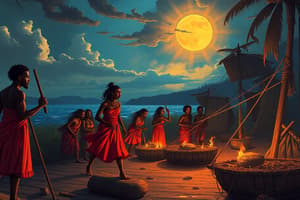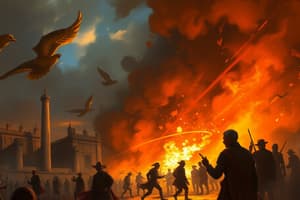Podcast
Questions and Answers
What was the significance of Rev. Francis Le Jau in the context of slavery and race in the English colonies?
What was the significance of Rev. Francis Le Jau in the context of slavery and race in the English colonies?
Rev. Francis Le Jau was significant for his writings that highlighted the experiences and conditions of enslaved Africans, influencing perceptions of race and slavery.
Describe the conditions of the Middle Passage and its impact on enslaved individuals.
Describe the conditions of the Middle Passage and its impact on enslaved individuals.
The Middle Passage involved horrific conditions with overcrowding, disease, and high mortality rates, resulting in profound trauma for enslaved individuals.
What was the purpose of the English Bill of Rights and how did it affect colonial governance?
What was the purpose of the English Bill of Rights and how did it affect colonial governance?
The English Bill of Rights aimed to limit the powers of the monarchy and affirm parliamentary rights, impacting colonial governance by promoting political rights.
Explain the role of Roger Williams in the establishment of Connecticut and Rhode Island.
Explain the role of Roger Williams in the establishment of Connecticut and Rhode Island.
What were the causes and outcomes of Bacon's Rebellion in colonial Virginia?
What were the causes and outcomes of Bacon's Rebellion in colonial Virginia?
Flashcards are hidden until you start studying
Study Notes
Slavery and the Making of Race
- Rev. Francis Le Jau was a key figure in the observation and documentation of slavery and its impact on society and race.
The Middle Passage
- Slavery in the 1660s was characterized by the establishment of plantations and a growing reliance on African slave labor in English colonies.
- Chattel slavery defined enslaved people as property, allowing for their sale, purchase, and inheritance.
- Native American mortality rates during this period were high due to conflict, disease, and displacement caused by European colonization.
- The Middle Passage was characterized by horrific conditions for enslaved Africans, with overcrowded ships, high mortality rates, and brutal treatment during the journey to the Americas.
English Bill of Rights
- The English Bill of Rights, enacted in 1689, established fundamental rights and liberties, influencing democratic governance and individual freedoms in English colonies.
New Colonies
- Maryland was established as a refuge for Catholics facing persecution in England, highlighting religious tolerance in colonial America.
- Connecticut and Rhode Island were founded by dissidents, including Roger Williams, emphasizing the importance of religious freedom and separation of church and state.
- New Netherland, initially a Dutch colony, became significant for its diverse population and trade network.
- New Amsterdam served as the capital of New Netherland before being captured by the English and renamed New York.
- The Dutch played a critical role in mercantile trade and cultural exchanges in the early colonial period.
- New Jersey, Pennsylvania, and the Carolinas emerged as vital colonies, each fostering distinct cultures and economies.
- The Walking Purchase of 1737 involved the deceptive acquisition of land from Native Americans, significantly expanding colonial territory at their expense.
Riot, Rebellion, and Revolt
- The Pequot War (1636-1637) was a violent conflict between Native Americans and English settlers, resulting in significant casualties for the Pequot tribe and territorial shifts.
- The Salem witch trials (1692) were a series of hearings and prosecutions of alleged witchcraft in colonial Massachusetts, reflecting societal fears and religious extremism.
- Bacon's Rebellion (1676) was a revolt led by Nathaniel Bacon against colonial authority, emphasizing class tensions and the demand for land among settlers.
- The Pueblo Revolt (1680) was a successful uprising by Native Americans against Spanish colonial rule in present-day New Mexico, highlighting resistance to oppression.
- The Yamasee War (1715-1717) in Carolina was a conflict between British settlers and various Native American tribes, driven by trade disputes and colonial expansion.
Studying That Suits You
Use AI to generate personalized quizzes and flashcards to suit your learning preferences.



